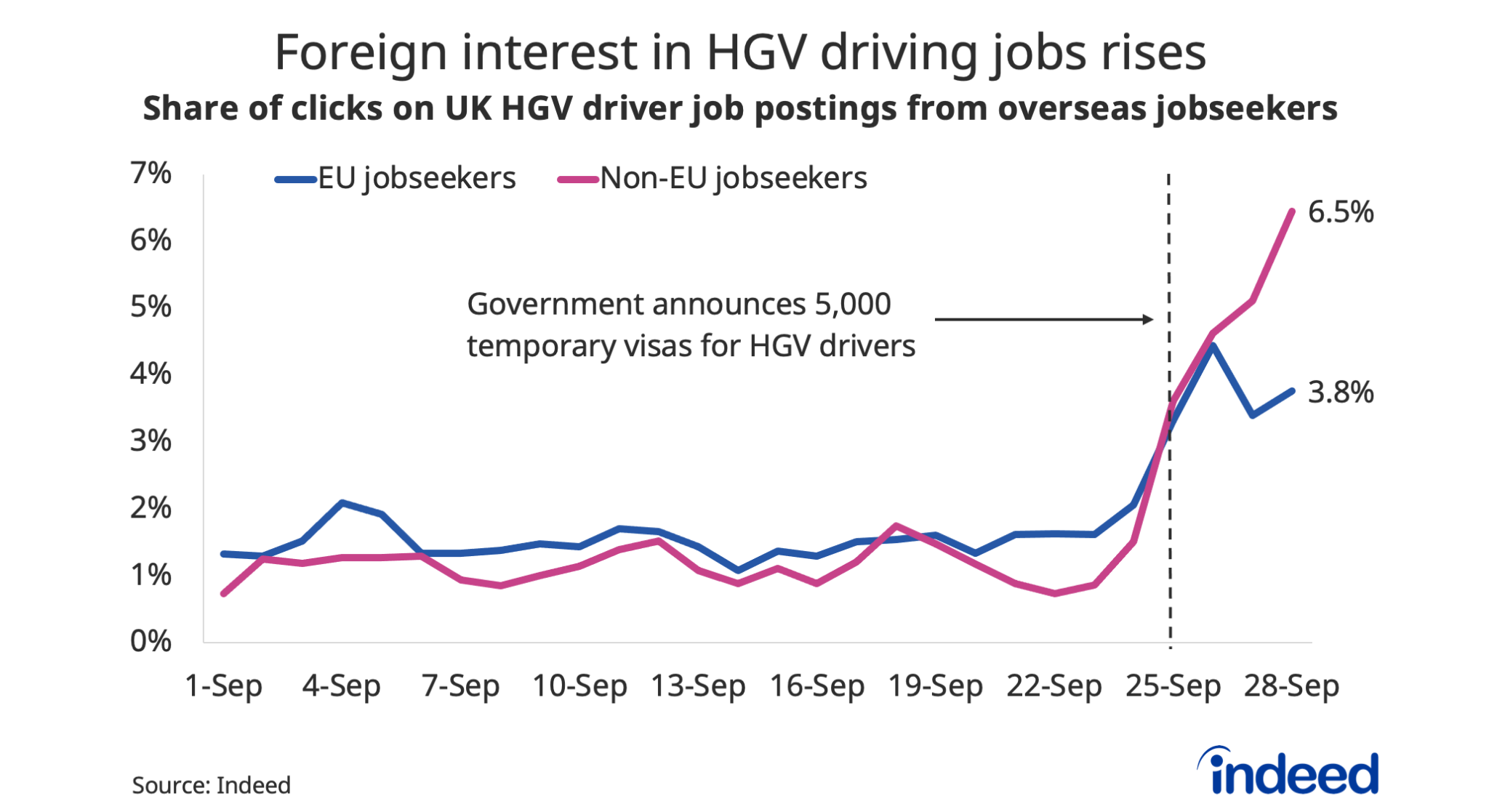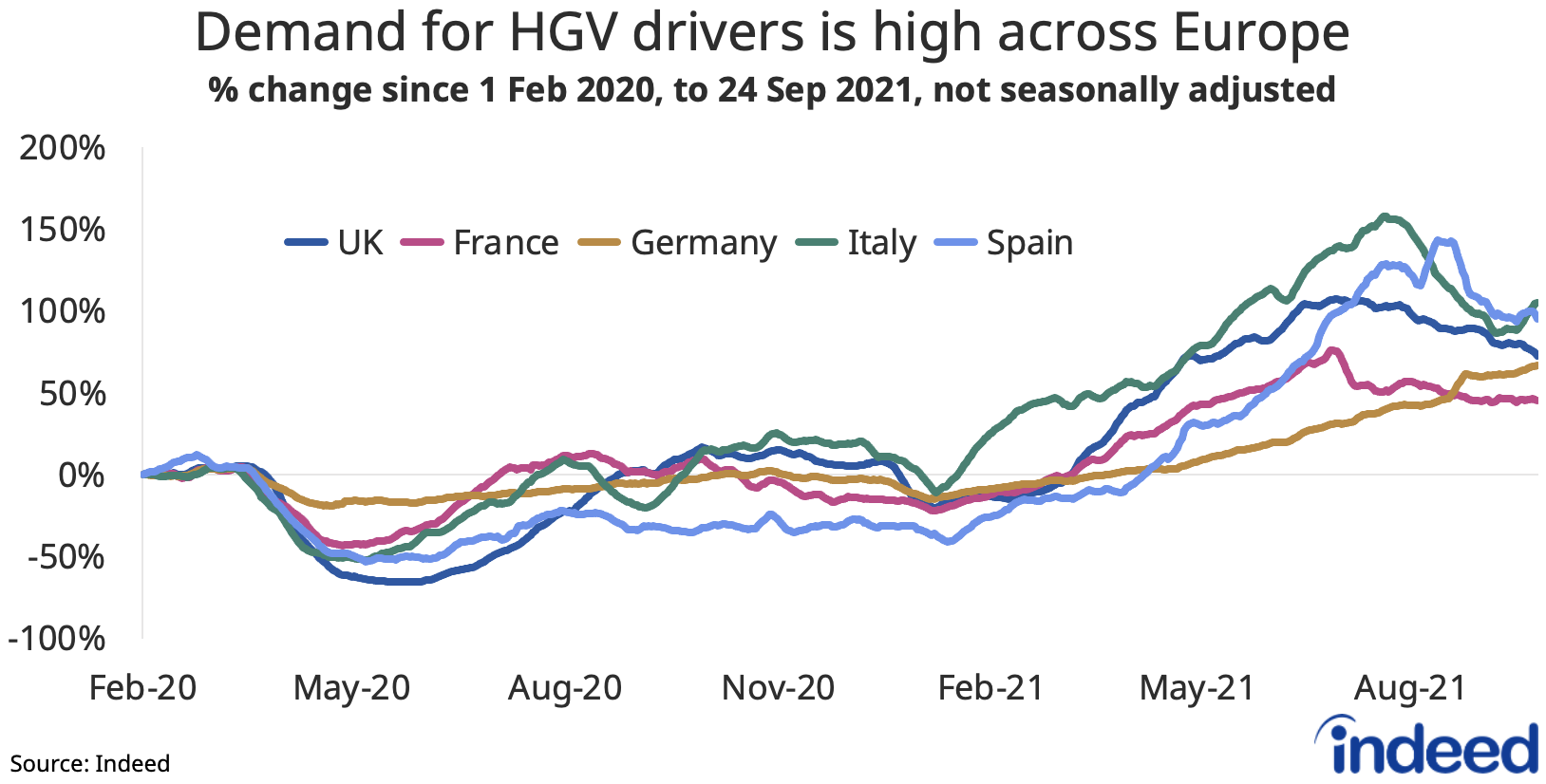-
Early signs show government plans to offer
emergency visas to foreign truckers could ease the UK’s driver
shortage after the world’s largest site Indeed recorded a 307%
spike in overseas interest in UK HGV
vacancies[1]
-
Indeed’s data shows candidates are mostly
coming from beyond the EU, as several other European countries
grapple with driver shortages just like
Britain
-
Applicants are being attracted by the UK’s
fast-rising driver salaries, with Indeed’s data revealing
median annual HGV driver salaries in job postings have risen by
19% so far this year, 14 times more than the 1.3% increase seen
in the wider jobs
market[2]
Temporary
visas for foreign drivers may help solve the UK’s HGV crisis, but
the truckers answering the call are coming from outside the
EU[1],
according to a new economic analysis by the world’s largest job
site Indeed.
Indeed
recorded a 307% spike in interest
in UK-based HGV jobs from overseas drivers in the days following
the government’s announcement that it will offer 5,000 temporary
visas to foreign drivers keen to work
here.
But
the bulk of interest came from non-European drivers; enquiries
from jobseekers based outside the EU soared by
627%.
Indeed’s
data suggests drivers from India, the UAE, South Africa, Poland
and Nigeria are keenest to answer the government’s
call.
Foreign jobseeker interest in HGV driving
jobs

Two
factors may explain the lower levels of interest from European
drivers. One is Brexit; it is now no easier for an EU-based
driver to get a UK job than it is for a non-EU candidate. The
other is that many EU countries are grappling with their own
shortages of HGV drivers.
With
European haulage firms raising wages to lure qualified drivers
from abroad, and EU citizens already able to work visa-free in
other EU countries, for European truckers this is an easier
option than relocating to the UK. By contrast non-EU citizens do
not have the automatic right to work in the EU, so the UK’s
emergency visa scheme is especially appealing to
them.
While
the chronic shortage of qualified HGV drivers has caused chaos in
the UK, disrupting deliveries of fuel and food to supermarkets,
demand for HGV drivers has actually grown faster in Spain and
Italy than here.
Demand for HGV drivers is high across
Europe

Demand
for HGV drivers in the UK has risen by
73% from pre-pandemic levels in February
2020 to September 2021. This is surpassed by Italy where demand
has risen by 105% and Spain, where
it has risen by
95%.
Germany
has seen a rise in demand similar to that of the UK, with German
job postings for HGV drivers up
67%; postings have risen by
45% in
France.
UK
haulage firms are battling to attract candidates by raising pay
and offering ‘golden hello’ sign-on bonuses. Between January and
September 2021, the median hourly wage for HGV driver jobs
advertised on Indeed increased 15%
from £13.05 to £15.00, while the median annual salary
advertised increased by 19% from
£30,000 to
£35,600[2].
These
pay rises compare to increases of just
1.3% across the wider jobs market,
adjusted for compositional changes. Average advertised salaries
for HGV drivers have therefore risen 14 times faster than
advertised salaries for all jobs.
The rise in HGV driver salaries since the start of
2021

Jack Kennedy,UK Economist at global job site Indeed,
comments:
“Petrol
shortages and the prospect of empty supermarket shelves have
spurred the government into action, and all eyes have turned to
our European neighbours to see if the offer of 5,000 temporary
visas will tempt EU drivers to return to the UK for
work.
“However,
we might be looking in the wrong direction, as the fact that so
many other European countries are wrestling with their own driver
shortages means EU-based drivers may opt to stay close to home
rather than move to post-Brexit
Britain.
“Fortunately
there has been a big spike in interest from drivers from outside
the EU. For them, British HGV jobs are likely to be highly
attractive due to the rapidly rising salaries and sign-on bonuses
on offer, even if the visas will only apply for a three-month
period.
“However
the government’s visa strategy is unlikely to be a complete
solution. Visas for 5,000 drivers may barely scratch the surface
of what is needed, as some estimates put the shortage as high as
100,000.
“Meanwhile,
non-EU drivers will be less likely to have the Driver CPC
qualification that’s required to drive HGVs in the UK and EU.
Getting one could eat into the time in which overseas drivers can
drive in the UK, and this roadblock could blunt the effectiveness
of the visa scheme.”
